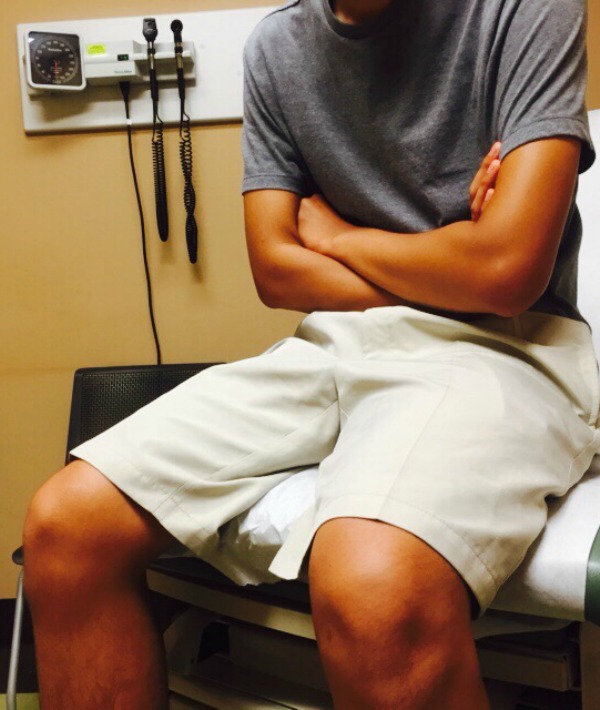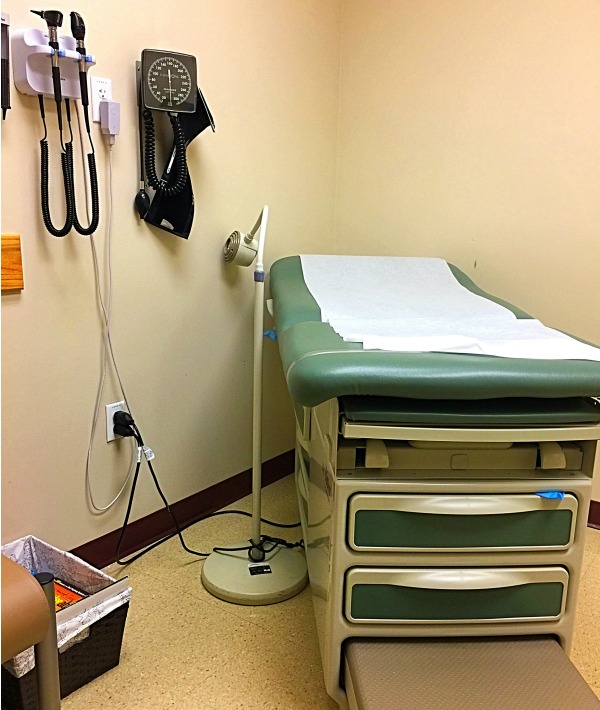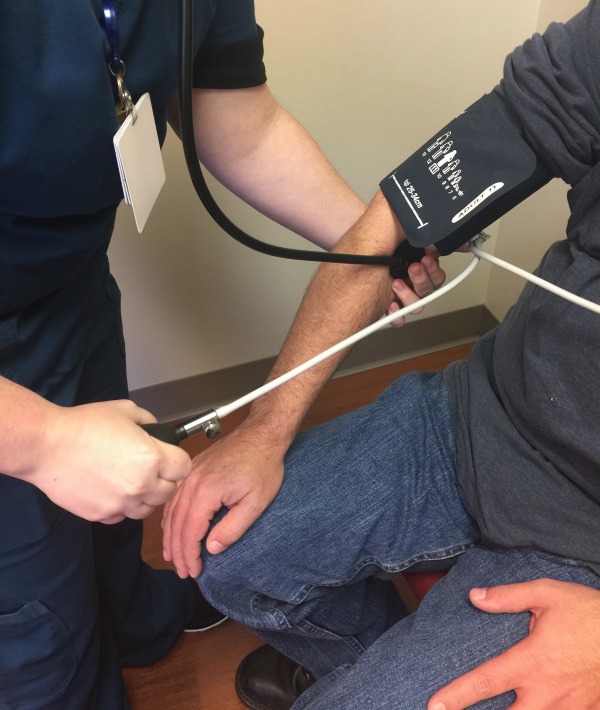
Men, it's time to see the doctor

We get it, guys. You're busy and feel pretty good each day, so why bother going to the doctor? It turns out there are many reasons you need to schedule a visit with your MD. Avoiding your doctor's office may be your thing, but could also result in scary medical issues (that are totally preventable). Here are the 20 most important screenings and exams you need to stay healthy and happy throughout your life.
Family history

There's actually a reason you're asked to fill out a questionnaire each time you go to the doctor. Your physician is screening you for potential medical problems that run in your family. Since certain health conditions could be inherited, it's crucial you arm your doctor with your family's medical history so they can order the right tests to keep you in the best of health.
Depression

Depression is real and it doesn't care what gender you are. Men are often taught to be tough and hide their feelings, which can be damaging to their emotional health and wellbeing. It's important that men get screened for depression (and answer the questions honestly) to help them and their doctors recognize any underlying issues that need to be addressed and treated.
Physical

If men want to be proactive about their health, they need to schedule an annual visit with their doctor. Routine physicals help track a patient's health throughout the years and can identify any potential health concerns before they turn into problems.
Obesity

Men may not want to talk about their growing midsection, but it's important for their health that they're screened for obesity by their MDs. Even doctors can be hesitant to mention a patient's weight, but according to the U.S. Preventive Services Task Force, all adults need to be evaluated based on their BMI to identify any weight-related health concerns (like high blood pressure, stroke and more).
Blood pressure

Men between the ages of 18 and 39 need to have their blood pressure checked at least every five years. Once they turn 40, it's necessary to monitor their BP every year. Knowing your baseline is important, as is monitoring for fluctuations in blood pressure which can signal other health problems, like cardiovascular disease.
STD and STI tests

Any man who is sexually active, and especially if they have multiple sex partners, needs to be tested regularly for STDs and sexually transmitted infections (STIs) including HIV and AIDS, gonnorhea, chlamydia, herpes and more. Just because a man doesn't have any outward signs of infection does not mean he's in the clear. Only a doctor can give a patient a clean bill of sexual health.
Testicular exam

Men and even boys need to have annual testicular exams and may benefit from performing monthly self-checks to feel for any lumps or unusual changes. Since men of any age can develop testicular cancer, it's important that they become familiar with what their testicals feel and look like so they can detect any changes. When found early, testicular cancer can be treated and cured.
Blood work

Blood is a vital source of important information about our overall health. In addition to a complete blood count (CBC) men need to have their glucose levels tested (which can indicate diabetes), a lipid panel (to check cholesterol levels) as well as a thyroid screening, and any other blood-tests required by their physician. These relatively simple screenings can cue a doctor in to any lurking health problems or areas of concern.
Cardiovascular health

Men have a greater risk of developing heart disease than a woman (until a woman reaches menopause, then the risk is equal). Having their ticker checked, especially if men are obese, smoke, drink alcohol, are inactive, have a poor diet or a family history of heart disease (or a combination of these factors) is a crucial step in identifying any underlying heart problems that can lead to heart disease.
Autoimmune disease

Not every man needs to be tested for autoimmune diseases, but men with a high AQ (autoimmune quotient—or a risk for developing an autoimmune disease, which includes a family history) need to push for blood tests that can help identify autoimmune diseases like rheumatoid arthritis, lupus and psoriasis. Although women account for 75 percent of all autoimmune diagnoses, it doesn't mean men are invulnerable to them.
Skin cancer

Men, you have twice the risk of developing basal cell carcinomas and are three times more likely than a woman to develop squamous cell carcinomas (both are forms of skin cancer) so get those moles checked out! If you've ever been sunburned, have a family history of skin cancer or have regular exposure to the sun, you have an increased risk of developing skin cancer and need to be diligent about regular check-ups and sun protection.
Eye and vision exam

Not only do men need to see the optometrist annually to make sure their vision isn't failing, they also need to be screened for diseases of the eye like cataracts, glaucoma and macular degeneration. Just because you think you have 20/20 vision doesn't mean you don't need to make an appointment with the eye doctor.
Dental check-ups

Whether men think they don't need to go to the dentist twice a year (they do!) or don't have the time, they're simply not as proactive about their oral health as women tend to be. Did you know that patients with periodontal disease are TWICE as likely to have heart disease? The link between our teeth, gums and overall health is constantly growing stronger and a great reason for men to schedule their next dental check up, stat!
Breast cancer

Although the rates of breast cancer in men are far fewer than in women—men do develop breast cancer and therefore need to be diligent about checking their pectorals for lumps or textural changes that could signify cancer. Because men have less breast tissue than women, its easier for cancer cells in the breast to spread, which makes early detection crucial for treatment.
Prostate

Since prostate cancer is the third deadliest cancer in men in the U.S., it's crucial they get exams each year beginning at the age of 40. For men with a family history of prostate cancer, they may need prostate exams even earlier. While these particular doctor visits can be awkward and uncomfortable, they're important for men to stay healthy.
Hearing

The advent of technology means we have lots of cool personal devices to keep us constantly entertained. Unfortunately for many men, that entertainment—which includes headphones blasting at full volume—can lead to permanent hearing loss. That's why it's so important for men to schedule hearing tests every five years until they're 45, and then it's every two years.
Bone density

While men under the age of 65 likely won't need a bone density test (unless they have other health factors or a family history of bone density loss) they definitely need one as they reach their senior years. The test, which is similar to an X-ray, can detect bone loss, which can lead to weakness and breaking. Treatment options are available, which makes testing an important tool for prevention.
Colorectal cancer

Colorectal cancer is no laughing matter. By the age of 50, men need to talk to their doctors about screening for colon and rectal cancers. Testing may include colonoscopy, fecal tests and CT scans to look for polyps and cancerous growths. Colorectal cancer is the third most common cancer in men (although not the third deadliest—that's prostate cancer), which means men need to make room in their busy lives for regular testing.
Aches and pains

One of the biggest disservices done to men is to tell them to "tough it out" when it comes to pain or injury. In the United States, men are half as likely to go to the doctor as women, making early diagnosis and treatment difficult. When men experience acute or chronic pain, or suffer an injury, it's imperative they visit the doctor to make sure they're not experiencing symptoms of a larger underlying problem.
Vaccines

Years ago humanity was able to wipe out common diseases like whooping cough, polio and measles, all thanks to the immunity-boosting power of vaccines. While parents may never stop debating the merits (or perceived dangers) of vaccination for children, men also need to get routine vaccinations and booster shots. The CDC recommends adults get annual flu shots and a Tdap booster every 10 years, and at least one shingles vaccine, even if they've had shingles in the past.




